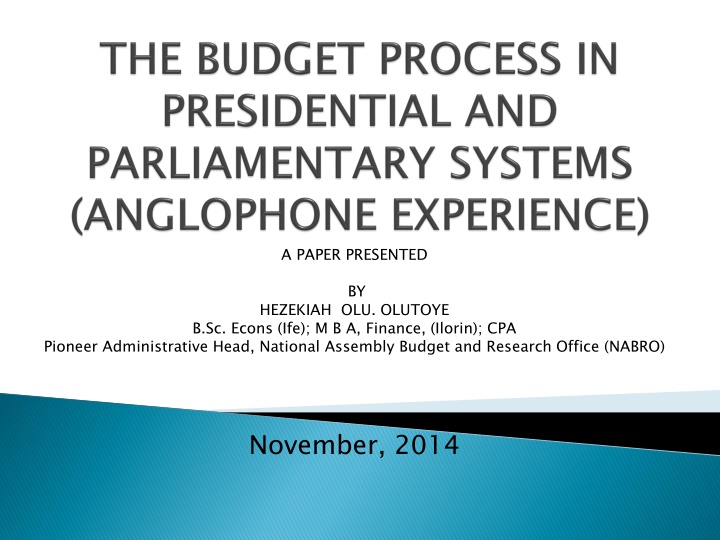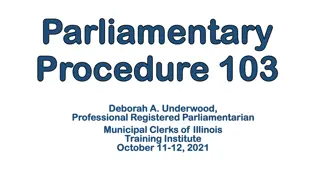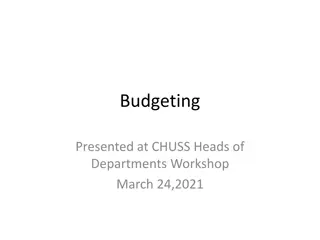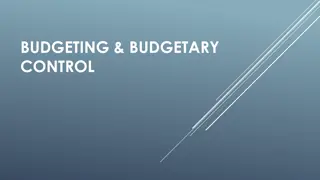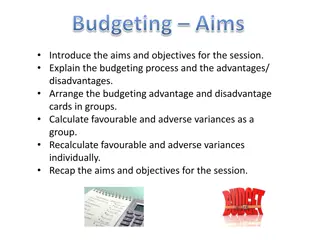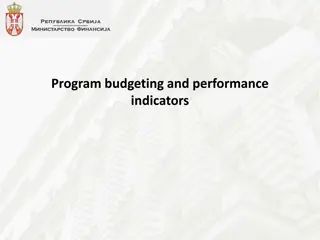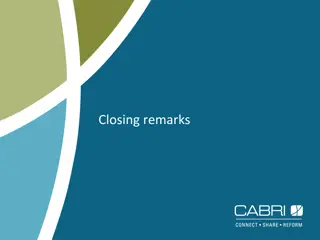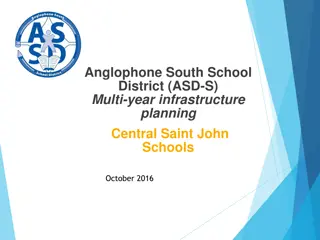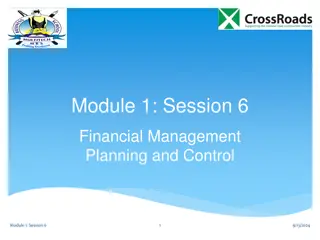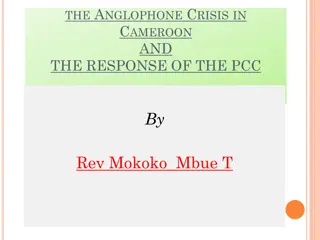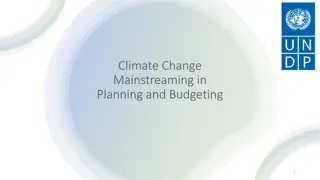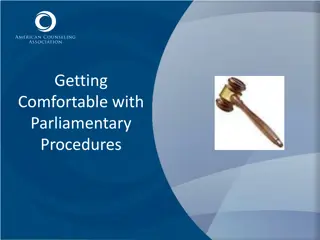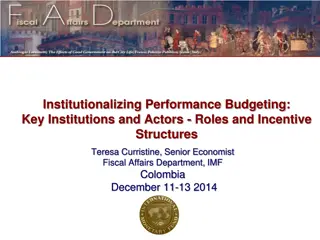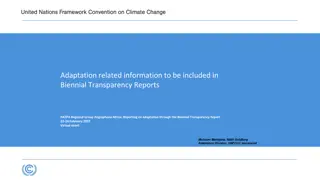Comparative Analysis of Presidential and Parliamentary Budgeting Systems in Anglophone Countries
The paper delves into the intricacies of the Presidential and Parliamentary systems of budgeting, highlighting the importance of budget as an economic policy tool. It compares the budgeting systems of Anglophone countries, emphasizing the roles of the executive and legislative branches in shaping national priorities. The discussion explores how the budget reflects a nation's needs and available resources, distinguishing between the Presidential and Parliamentary models. Examples from countries like the USA, Nigeria, and Britain showcase the application of these systems.
Download Presentation

Please find below an Image/Link to download the presentation.
The content on the website is provided AS IS for your information and personal use only. It may not be sold, licensed, or shared on other websites without obtaining consent from the author.If you encounter any issues during the download, it is possible that the publisher has removed the file from their server.
You are allowed to download the files provided on this website for personal or commercial use, subject to the condition that they are used lawfully. All files are the property of their respective owners.
The content on the website is provided AS IS for your information and personal use only. It may not be sold, licensed, or shared on other websites without obtaining consent from the author.
E N D
Presentation Transcript
A PAPER PRESENTED BY HEZEKIAH OLU. OLUTOYE B.Sc. Econs (Ife); M B A, Finance, (Ilorin); CPA Pioneer Administrative Head, National Assembly Budget and Research Office (NABRO) November, 2014
By the end of this lecture, our objective is to ensure that participants understands the intricacies of both Presidential and Parliamentary systems of budgeting. That they are able to distinguish between the two and analyse the advantages of one over the other Appreciate that no two nations have exactly the same budgeting system
The Budget is the most important economic policy tool of the Government and provides a comprehensive statement of the nation s priorities . As the representative of the people, parliament is the appropriate place to ensure that the Budget best matches the nation s needs with available resources. Budgeting in Anglophone Countries can be broadly divided into Presidential or Parliamentary systems of budget.
Anglophone Countries are countries where English is an official language. The main Anglophones are: U.K., Ireland, U.S., Canada, Australia, New Zealand, Jamaica, South Africa, India, and Nigeria. But there are many others, mainly in West and Southern Africa Presidential system of Government is where a head of government is also head of state and leads an executive branch that is separate from the legislative branch (separation of power) Parliamentary system of Government is a system of democratic governance of a state in which the executive branch derives its democratic legitimacy from, and is held accountable to, the legislature (parliament); the executive and legislative branches are thus interconnected. 1. 2. 3.
4. A budget is a quantitative expression of a plan for a defined period of time. It may include planned sales volumes and revenues, resource quantities, costs and expenses, assets, liabilities and cash flows. It expresses strategic plans of business units, organizations, activities or events in measurable terms 5. United States of America typifies the presidential system of Government (and Budgeting) while there are Countries among the Anglophones who takes after them. E.g. Nigeria 6. Britain practices Parliamentary system of Government and Budgeting and so also have their followers. E.g. South Africa
Generally speaking, the presidential system of government gives more power to the Legislators than the Executives in the sense that: I. the budget estimates are prepared by the executive for approval by the legislators. II. The various legislators exercises varying degree of authorization on the estimates III. There is active participation through the committee systems in budget scrutiny, approval and oversight IV. Using the Nigerian example, the constitution gives the power of the purse to the legislature. V. Although the President has the power to withhold his assent on a passed budget, (VETO), the Legislators can overturn that Veto through legislative process.
The budget cycle includes: Collation of budget from various Government Ministries, Departments and Agencies (MDAs) by the Ministry of Finance or the Executive arm s Budget Office. The Government s revenue generating Agencies under the auspices of the Ministry of Finance are expected to work on the revenue profile which will accompany the expenditure side Such collated/submitted proposals are subjected to vetting in order to reduce excess demands The prepared expenditure proposal are first considered by the cabinet before its presentation to Parliament.
At the Parliament/Congress, the budget is presented by the President to a joint sitting of the Parliament (where it is bi-cameral in nature). Or to the parliament where it is mono-cameral in nature The president s speech contains the parameters and policy framework on which the budget is based. It also reviews the current budget in line with the proposed and forthcoming one so as to have a synergy of programmes The presentation to parliament is taken as first reading (which is a mandatory legislative process in the consideration of bills/budgets)
The Senate President and the Speaker then controls the consideration of the budget autonomously in each chamber by allocating time frame for the second reading which is the general debates of principles underlying the policy frame work of the budget. After the Debates on the general principles, the proposed budget estimates are referred to the Committee on Appropriations and all other Standing Committees of the two Chambers becomes Sub-Committees of their respective Appropriation Committees. The portion of the budget pertaining to each Committee is then given to them to enable them invite their respective Ministries Department and government agencies (MDAs) and consider their proposal together before they make their recommendations to the Appropriation s Committee
The revenue projections and the expenditure profile for the next three years are prepared as either Rolling plans or Medium Term Expenditure Framework and by constitution required to be approved even before the presentation of the yearly Budget which consist of just one year. Both the expenditure and revenue are mere proposals which must be subjected to Parliamentary scrutiny before they are passed into law. In the United States of America which is the mother of Presidential system of budgeting, the proposal submitted by Government are seldom used as the Parliament has well instituted analytical office the Congressional Budget Office (CBO) which provide a more superior proposal for use by the parliament in the consideration of the budget.
The various Committee submits their recommendations to the Appropriations Committee who in turn will consider the available revenue as determined after scrutiny by the relevant Committee(s) to come up with budget recommendations for each MDAs The recommendation of the appropriation Committee is thereafter subjected to further scrutiny at plenary where the Committee of Supply (Committee of the whole that is considering the Money Bill) makes final amendment to the various allocations one after the other. The approved allocations are then prepared neatly and forwarded to the other chamber and vice versa.
The two leaders of the bi-cameral legislature then set up equal number of Harmonisation Committee to review ONLY the areas of differences in the passed budget and come up with a joint recommendation on such for the consideration of both Chambers separately. Where they could not reach a consensus, there will be a joint sitting of both Chambers to consider the area of contention and each member Senator or Representative is entitled to one vote to make the decision. This why the House of Representatives which is larger in number has an upper edge in budget matters.
The harmonised budget is thereafter forwarded to the President for assent to make it a law. Where he withhold his assent, the parliament can overturn the veto after thirty working days at a joint sitting. This process differ slightly from country to country based on the provisions of their Constitution The time of approval also varies from country to country based on their constitutional provisions.
There is a contrast between the Presidential and Parliamentary system of budgeting. In a Parliamentary Budgeting the Executive controls the budget through the Chancellor of the Exchequer and his Secretary The Budget, or Financial Statement, is a statement made to the House of Commons by the Chancellor of the Exchequer on the nation s finances and the Government s proposals for changes to taxation. The Budget also includes forecasts for the economy by the Office for Budget Responsibility (OBR). The Annual Budget Statement delivered in Parliament contains all the revenue legislation for the year, along with a few spending plans that reflect government priorities.
the Spending Reviews then allocate discretionary spending among government departments. At the Parliament, the Chancellor of the Exchequer delivers his Budget statement to Members of Parliament in the House of Commons. The first part of the statement typically begins with a review of the nation's finances and the economic situation. The statement then moves on to proposals for taxation. The power to make tax changes on an interim basis, before the Finance Bill is passed, comes from the House of Commons approving a motion for the provisional collection of these taxes.
After the Chancellor finishes his speech but before the Leader of the Opposition responds, the Chairman of Ways and Means puts a single motion to the Commons asking for agreement to these changes. In essence the submission of the Chancellor of the Exchequer is automatically approved Debates on the Budget Resolutions (tax measures announced in the Budget) takes place shortly after the approval and it is led traditionally the Leader of the Opposition Each day of debate covers a different policy area such as health, education and defence
There is a shadow Chancellor who represents the majority party and he makes his response the day after the Budget statement during the Budget debates. Budget Resolutions can come into effect immediately if the House of Commons agrees to them at the end of the four days of debate but they require the Finance Bill to give them permanent legal effect A new Finance Bill is presented to Parliament each year, it enacts the proposals for taxation made by the Chancellor of the Exchequer in his Budget statement and brings them into law. The Finance Bill is passed through Parliament in the same way as any other bill
The House of Lords has a limited role in respect of Finance Bills as the House of Commons has the sole right to initiate and amend bills whose main purpose is to levy taxes or authorise expenditure. The House of Lords will have a second reading debate on the Finance Bill but they will not consider the Bill clause by clause and will not amend the Bill. The scrutiny of budget is done at the House of by the Commons Treasury Select Committee which is a cross-party committee of Members of Parliament whose role is to scrutinize the work of the Treasury.
The Treasury Select Committee conducts inquiries into the Government s proposals, gathering evidence from expert witnesses and publishing a report with its conclusions and recommendations. The Government then produces a report in response to the Committee s findings, often with a contribution from the Office for Budget Responsibility (OBR). The House of Lords Economic Affairs Sub-Committee examines selected aspects of the Finance Bill, including tax administration, clarification and simplification. In essence the chancellor of the Exchequer holds the axe in terms of budget in a Parliamentary system of Government while the Parliament passes the money Bills. The only real check on the Chancellor s power is the Prime Minister, who is both the leader of the majority political party in Parliament and the Head of the British Government.
The starkest contrast between the Presidential and the Parliamentary counterpart is the lack of a formal separation of powers. This also reflects in the differences in their budget process. Legislative powers to budgetary process is better in Presidential systems than in Parliamentary systems. Parliamentary and presidential regimes are founded on different constitutional principles, and this is a central choice in any democratic constitution which affects their budget process.
Parliament often struggle with the Monarchy over control of the country; but as the Monarchy slowly ceded its powers to government ministers, no other checks were put in place to balance the government s executive power. On the other hand the Congress in the USA wield enormous power over the budget Generally speaking the right of legislators over budget varies from one country to another. In other words Committees which are the engine room of Legislature play varying degrees of roles in budgeting process.
S/ N N S/ Number of countries Number of countries Rights Rights 1 1 32 May reduce and increase expenditure and revenue 2 2 3 3 17 4 May reduce but not increase expenditure May reduce expenditure, but only increase it with the permission of the Government 4 4 13 May reduce and increase expenditure if alternative provisions are made elsewhere 5 5 6 6 15 1 82 Rights not specified . Not applicable (Nicaragua) TOTAL
The two systems practices both multi-year and annual budget process. For instance both South Africa and Nigeria uses Medium Term Expenditure Framework (MTEF). The lower House in both systems have upper hand in budgeting than the upper one. It is easier to get budget passed in a Parliamentary system than in presidential since the legislature produces the executive in a parliamentary system.
From the above, we can see that both systems have degrees of oversight/scrutiny on the budget and in effect on the economy. There is no way budgeting can be overlooked in any system of government otherwise that government will face serious economic problems. While the Parliamentary system of government is interwoven with the legislature, the presidential is separated.
